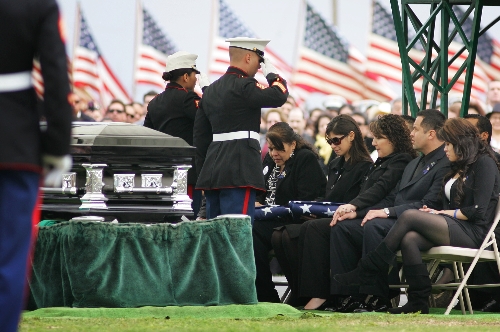2010 deadly for police in U.S., not Southern Nevada
ATLANTA -- Two officers in a remote Alaska town were ambushed as they chatted on a street. A California officer and deputy were killed by an arson suspect with a high-powered rifle as they tried to serve a warrant. Two other officers doing anti-drug work were gunned down by men along a busy Arkansas highway.
These so-called cluster killings of more than one officer helped make 2010 a particularly deadly year for law enforcement. Deaths in the line of duty jumped 37 percent to about 160 from 117 the year before, according to numbers as of Tuesday compiled by the National Law Enforcement Officers Memorial Fund, a nonprofit that tracks police deaths.
There also was a spike in shooting deaths. Fifty-nine federal, state and local officers were killed by gunfire in 2010, a 20 percent jump from last year's figures, when 49 were killed. The total does not include the death of a Georgia State Patrol trooper shot in the neck Monday night in Atlanta as he tried to make a traffic stop.
And 73 officers died in traffic incidents, a rise from the 51 killed in 2009, according to the data.
Craig Floyd, director of the Washington-based fund, said the rise in fatalities could be an aftershock of the nation's economic troubles as officers in some communities cope with slashed budgets.
"We're asking our officers to do more with less. We're asking them to fight conventional crime, and we're asking them to serve on the front lines in the war against terror," he said.
But 2010 has been a relatively quiet year in Southern Nevada, where no officers this year have died in the line of duty.
But the year began with violence and a death that doesn't register in the nationwide count. On Jan. 4, Lloyd George U.S. Courthouse private security officer Stan Cooper, a 72-year-old retired Las Vegas police officer, was shot and killed by Johnny Lee Wicks, who took a shotgun to the courthouse after being denied some Social Security benefits. Wicks was killed by other armed security and deputy U.S. marshals. One deputy marshal was wounded.
This year was a stark contrast to 2009, when four Metropolitan Police officers were killed in what was the deadliest year in the agency's history.
Three of the on-duty deaths involved car crashes, spurring adoption of new driving policies.
In November, 2009, officer Daniel Leach, 49 died in a collision on U.S. Highway 95 near Searchlight.
Less than a week before, officer Trevor Nettleton, 30, was gunned down in a botched robbery at his North Las Vegas home.
In Oct., 2009, Officer Milburn "Millie" Beitel, 30, was killed in a crash on Nellis Boulevard near Washington Avenue. Beitel was driving 71 mph in the 45 mph zone; was not using emergency lights or sirens; and wasn't wearing a seat belt.
Six months earlier, James Manor, 29, died while responding to a domestic dispute call. He was driving 109 mph without lights and sirens on Flamingo Road when a pickup turned in his path. He was not wearing a seat belt.
Last year's nationwide toll of 117 officers killed was a 50-year low that encouraged police groups. But this year's total is more the norm than an anomaly: The number of police deaths has topped 160 five times since 2000, including 240 in 2001. The annual toll routinely topped 200 in the 1970s, and in the 1920s.
Las Vegas Review-Journal reporter Antonio Planas contributed to this report.






















